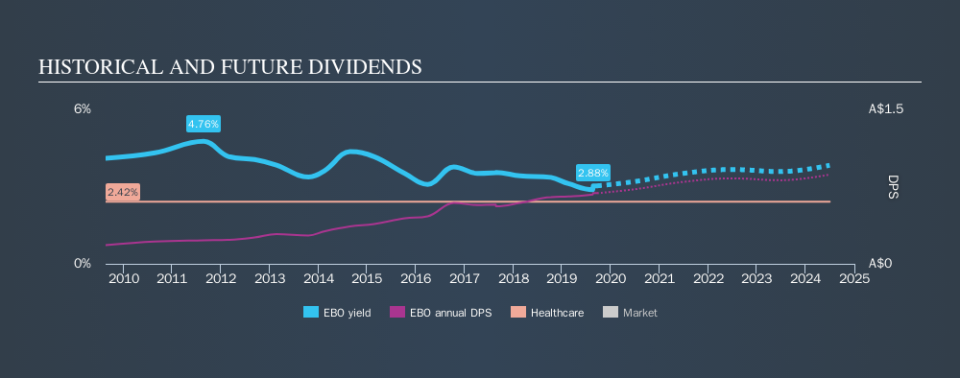EBOS Group Limited (NZSE:EBO) Goes Ex-Dividend In 3 Days

EBOS Group Limited (NZSE:EBO) is about to trade ex-dividend in the next 3 days. This means that investors who purchase shares on or after the 26th of September will not receive the dividend, which will be paid on the 11th of October.
EBOS Group's upcoming dividend is NZ$0.4 a share, following on from the last 12 months, when the company distributed a total of NZ$0.7 per share to shareholders. Looking at the last 12 months of distributions, EBOS Group has a trailing yield of approximately 3.0% on its current stock price of NZ$24.5. Dividends are a major contributor to investment returns for long term holders, but only if the dividend continues to be paid. That's why we should always check whether the dividend payments appear sustainable, and if the company is growing.
View our latest analysis for EBOS Group
Dividends are typically paid from company earnings. If a company pays more in dividends than it earned in profit, then the dividend could be unsustainable. Its dividend payout ratio is 76% of profit, which means the company is paying out a majority of its earnings. The relatively limited profit reinvestment could slow the rate of future earnings growth It could become a concern if earnings started to decline. That said, even highly profitable companies sometimes might not generate enough cash to pay the dividend, which is why we should always check if the dividend is covered by cash flow. EBOS Group paid out more free cash flow than it generated - 118%, to be precise - last year, which we think is concerningly high. It's hard to consistently pay out more cash than you generate without either borrowing or using company cash, so we'd wonder how the company justifies this payout level.
While EBOS Group's dividends were covered by the company's reported profits, cash is somewhat more important, so it's not great to see that the company didn't generate enough cash to pay its dividend. Were this to happen repeatedly, this would be a risk to EBOS Group's ability to maintain its dividend.
Click here to see the company's payout ratio, plus analyst estimates of its future dividends.
Have Earnings And Dividends Been Growing?
Businesses with strong growth prospects usually make the best dividend payers, because it's easier to grow dividends when earnings per share are improving. If earnings fall far enough, the company could be forced to cut its dividend. This is why it's a relief to see EBOS Group earnings per share are up 9.0% per annum over the last five years. Earnings have been growing at a steady rate, but we're concerned dividend payments consumed most of the company's cash flow over the past year.
The main way most investors will assess a company's dividend prospects is by checking the historical rate of dividend growth. EBOS Group has delivered an average of 14% per year annual increase in its dividend, based on the past ten years of dividend payments. We're glad to see dividends rising alongside earnings over a number of years, which may be a sign the company intends to share the growth with shareholders.
To Sum It Up
Should investors buy EBOS Group for the upcoming dividend? Earnings per share have grown somewhat, although EBOS Group paid out over half its profits and the dividend was not well covered by free cash flow. Overall it doesn't look like the most suitable dividend stock for a long-term buy and hold investor.
Curious what other investors think of EBOS Group? See what analysts are forecasting, with this visualisation of its historical and future estimated earnings and cash flow.
We wouldn't recommend just buying the first dividend stock you see, though. Here's a list of interesting dividend stocks with a greater than 2% yield and an upcoming dividend.
We aim to bring you long-term focused research analysis driven by fundamental data. Note that our analysis may not factor in the latest price-sensitive company announcements or qualitative material.
If you spot an error that warrants correction, please contact the editor at editorial-team@simplywallst.com. This article by Simply Wall St is general in nature. It does not constitute a recommendation to buy or sell any stock, and does not take account of your objectives, or your financial situation. Simply Wall St has no position in the stocks mentioned. Thank you for reading.

